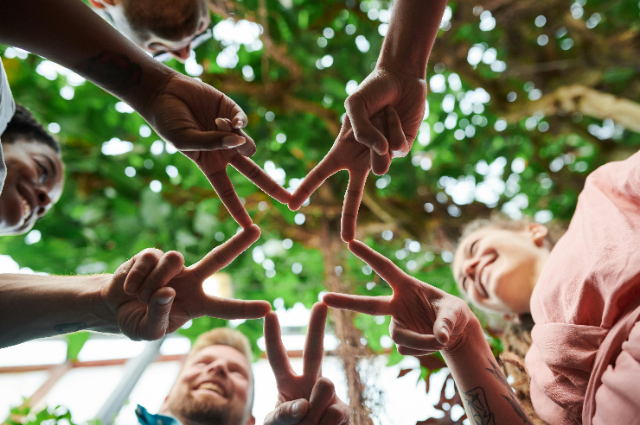
Open your arms to all, let your heart embrace, For the world is one family, in every race.
“Vasudhaiva Kutumbakam” an ancient Indian phrase translating to the word as a family captures this idea perfectly. In a world marked by diverse cultures, languages, and ideologies, the ancient Indian phrase "Vasudhaiva Kutumbakam" resonates as a beacon of hope and a guiding principle for humanity. It weaves threads of unity and interconnectedness among all living beings. It encapsulates the profound idea that we are all bound together in a harmonious web of life. It reminds us that we are not just citizens of our nations; we are citizens of the world, bound by a common thread of humanity. When we adopt this philosophy, we begin to see our global family in all its beauty and diversity, embracing our differences with open hearts and minds. The mantra of Vasudhaiva Kutumbakam whispers the melody of unity in the symphony of diversity. It encourages us to recognize that our cultural richness and heritage are not walls that separate us but windows that reveal the splendor of our shared human experience.
This timeless concept emphasizes compassion, inclusivity, and the recognition of our shared humanity across geographical, cultural, and ideological boundaries. It beckons us to rethink the boundaries that divide us and embrace a shared destiny. It holds the promise of fostering collaboration, understanding, and compassion on a global scale. Like any family, we, too, experience conflicts and disagreements. Yet, Vasudhaiv Kutumbakam teaches us the art of dialogue and understanding. When we approach our differences with an open mind and a willingness to listen, we break down barriers and build bridges.
The phrase “Vasudhaiva Kutumbakam” comes from the sanskrit shloka अयं निजः परो वेति गणना लघुचेतसाम्।उदारचरितानां तु वसुधैव कुटुम्बकम्॥
Its origins can be traced back to 700 BCE. It is written in chapter 6 of the Maha Upanishad, a Hindu scripture belonging to the Samveda tradition These scriptures laid the foundation for the concept by extolling the idea of universal brotherhood and unity. Rooted in the fabric of Indian philosophy, Vasudhaiva Kutumbakam has permeated through generations, guiding individuals toward a holistic perspective that goes beyond divisions and encourages a broader understanding of humanity's shared essence.
In today's increasingly interconnected world, the philosophy of Vasudhaiva Kutumbakam holds immense relevance. Global challenges such as climate change, pandemics, and economic inequality transcend national boundaries, necessitating collaborative solutions. The interconnected nature of modern economies, cultures, and technologies underscores the importance of viewing the world through the lens of a unified family. This philosophy encourages us to move beyond our narrow self-interests and work together for the greater good, recognizing that the welfare of one is intricately tied to the welfare of all.
The Group of Twenty (G20), an international forum comprising the world's major economies, mirrors the ethos of Vasudhaiva Kutumbakam on the global stage. This forum serves as a platform for addressing critical economic issues and fostering cooperation among nations. The G20 embodies the spirit of recognizing that economic prosperity and stability are collective goals, transcending national boundaries. By engaging in dialogue and collaboration, member nations demonstrate their commitment to the idea that global challenges require global solutions.
Within the G20, the principles of Vasudhaiva Kutumbakam manifest through collaborative efforts towards global economic stability. Member nations recognize that a harmonious global economic landscape benefits everyone involved. By sharing insights, resources, and expertise, the G20 embodies the spirit of unity and cooperation, echoing the philosophy that transcends national interests for the greater good.
However inspiring, the realization of Vasudhaiva Kutumbakam faces several challenges. Historical prejudices, geopolitical tensions, and economic disparities have created deep-rooted divisions among nations and communities. They can obstruct the path to global unity. In tackling these issues, education and awareness play pivotal roles. Promoting cultural exchange programs, embracing diversity in curricula, and cultivating intercultural understanding can dismantle prejudices and foster empathy. Diplomatic efforts and international treaties can bridge differences and facilitate meaningful conversations. Empowering international organizations and strengthening their mandates can facilitate global cooperation. Initiatives that encourage collaborations in fields like science, technology, and healthcare, such as the World Health Organization's pandemic response, highlight the potential of collective action in addressing global crises. By nurturing a culture of cooperation and mutual respect, we can overcome the barriers that stand in the way of Vasudhaiva Kutumbakam's realization.
We can also find hope in the realization that the world has overcome such challenges in the past. We have witnessed how the end of apartheid in South Africa shattered barriers that once seemed insurmountable. These transformative moments stand as a testament to the power of unity and collective action.
In conclusion, the tale of Vasudhaiv Kutumbakam invites us to be protagonists in the grand story of humanity. It urges us to break free from the shackles of narrow-mindedness and embrace the vastness of our global family. As we face pressing global challenges, this ancient philosophy continues to inspire and guide us toward a future of peace, harmony, and prosperity for all. The journey may be challenging, and obstacles may stand in our way, but let us remember that we are not alone. We are part of a larger fabric of life, and together, we can weave a tapestry of love, understanding, and unity.
In embracing this profound philosophy, we affirm our commitment to collective well-being and the preservation of our shared home, planet Earth. Let Vasudhaiva Kutumbakam guide our actions and decisions, as we write the next chapters of humanity's story with compassion, inclusivity, and hope. Together, we can create a world where Vasudhaiv Kutumbakam is not just a philosophy, but a living reality.
